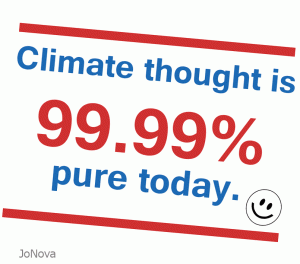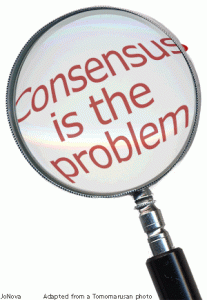 A new paper tries to clean up the chicken entrail decrees of Mark Lynas (and earlier of John Cook) and concludes that their methodology is so bad, a 99.85% consensus could just as easily have been 32%.
A new paper tries to clean up the chicken entrail decrees of Mark Lynas (and earlier of John Cook) and concludes that their methodology is so bad, a 99.85% consensus could just as easily have been 32%.
All the papers in between 32 and 99% were neutral on the cause of man-made climate catastrophes, but Lynas et al bundled them in with the believer pack and made hay in the global media. This was even though many of the “neutral” papers showed results that didn’t fit the consensus. But who cares about results eh? If an abstract was neutral, it was therefore a “sign” the authors believed — like reading their tea leaves, or laying out the entrails. (Either that or it was a sign scientists who question the dogma get sacked, lose funding, and get uninvited to laboratory barbeques, but, shh! We won’t mention that.) So Lynas assumes that as long as a scientist doesn’t specifically say they disagree, they de facto endorse the “consensus”.
Why do people who call themselves scientists even talk about a “consensus”?
Obviously if believers had evidence, they’d talk about that instead.
 Dentelski et al do an admirable job of pointing out galactic level bias, grand flaws and wild assumptions of Lynas, but the central fallacy of The Global Industry of Sciencery is barely mentioned. Why do people who call themselves scientists even talk about using consensuses as an instrument of “Truth Seeking”? The whole idea that truth can be figured out by interpreting the first paragraph of industry publications is a parody of science. It’s a fallacy of science (or three at once).
Dentelski et al do an admirable job of pointing out galactic level bias, grand flaws and wild assumptions of Lynas, but the central fallacy of The Global Industry of Sciencery is barely mentioned. Why do people who call themselves scientists even talk about using consensuses as an instrument of “Truth Seeking”? The whole idea that truth can be figured out by interpreting the first paragraph of industry publications is a parody of science. It’s a fallacy of science (or three at once).
We might as well add up the funding offered to each side of a theory and declare the issue settled. 99% of climate funding is paid to scientists who don’t rock the boat, therefore climate sensitivity on the third rock from the sun is 3.3 degrees…
If the opinions of scientists counted in science, we’d just survey them directly anyway instead of conducting seances on abstracts. But when we do, the consensus blows away. Outside the star chamber of the IPCC junkets, half of Meteorologists and two thirds of Engineers and Geologists flatly didn’t agree. There’s nothing remotely like a consensus in the world of science in the hideously complex and immature world of climate prophesies. Those polling results were done in 2017 and 2012, but the results scared the science pollsters so much, they have been too frightened to ask them ever since.
 If the magic wand of “consensus” worked, research could be so much cheaper. Who needs the satellites and thermometers, when opinions cost so little?
If the magic wand of “consensus” worked, research could be so much cheaper. Who needs the satellites and thermometers, when opinions cost so little?
As Kenneth Richards says at No Tricks Zone: 67% Of Scientific Papers Can Be Said To Reject The AGW Hypothesis…
Of the 3,000 papers analyzed in Lynas et al., 282 were deemed not sufficiently “climate-related.” Another 2,104 papers were placed in Category 4, which meant either the paper’s authors took “no position” or the position on AGW was deemed “uncertain”…in the abstract. So, exploiting the “if you are not against, you are for” classification bias, Lynas and colleagues decided that the authors of these 2,104 scientific papers in Category 4 do indeed agree with AGW, as what is written in the abstract does not explicitly state they do not agree.
Interestingly, if this classification bias had not been utilized and the thousands of Category 4 (“no position” or “uncertain”) papers were not counted as supporting AGW, only 892 of the 2,718 (climate-related) papers, or 32%, could be said to have affirmatively stated they support AGW. So, simply by assuming one cannot divine the AGW opinions of authors of scientific papers by reading abstracts, it could just as facilely be said that 67% (1,826 of 2,718) of climate-related papers reject AGW.
As I’ve said before, these junk consensus studies are merely sociological surveys of the purity of government funding:
Given the $7 billion in funding from the US government for the 2015 financial year, marked for climate science and clean energy, it is hardly surprising that there are a lot of papers about “climate change” and “global warming”. There are a lot of people studying how big the crisis might be, how to solve the crisis we might be having, and what the effects of this crisis might be (if we are having one). What there is not, are institutions of people specifically tasked to investigate how minor CO2 is, how beneficial it is, or to assess if the Sun controls most of our climate. Around the Western world there is no government funding specifically to audit or find problems with the man-made global warming theory. There are no programs with the sole purpose of finding natural causes to provide the counter arguments ($0). The purity is near complete. Skeptics mostly have to fund themselves. That’s a very high barrier to publication.
In a complex science, purity of opinion is a bad sign.
REFERENCES
Dentelski, David, Ran Damari, Yanir Marmor, Avner Niv, Mor Roses, and Yonatan Dubi. (2023) “Ninety-Nine Percent? Re-Examining the Consensus on the Anthropogenic Contribution to Climate Change” Climate 11, no. 11: 215. https://doi.org/10.3390/cli11110215
Lynas, M.; Houlton, B.Z.; Perry, S. Greater than 99% consensus on human caused climate change in the peer-reviewed scientific literature. Environ. Res. Lett. 2021, 16, 114005. [Google Scholar] [CrossRef]
Cook, J.; Nuccitelli, D.; Painting, R.; Honeycutt, R.; Skuce, A.; Jacobs, P.; Green, S.A.; Lewandowsky, S.; Richardson, M.; Way, R.G. Reply to ‘Quantifying the consensus on anthropogenic global warming in the scientific literature: A re-analysis’. Energy Policy 2014, 73, 706–708. [Google Scholar] [CrossRef]
Cook, J.; Nuccitelli, D.; Green, S.A.; Richardson, M.; Winkler, B.; Painting, R.; Way, R.; Jacobs, P.; Skuce, A. Quantifying the consensus on anthropogenic global warming in the scientific literature. Environ. Res. Lett. 2013, 8, 024024. [Google Scholar] [CrossRef]
Cook, J.; Cowtan, K. Reply to Comment on ‘Quantifying the consensus on anthropogenic global warming in the scientific literature’. Environ. Res. Lett. 2015, 10, 039002. [Google Scholar] [CrossRef]
Art: Witchdoctors: US CDC